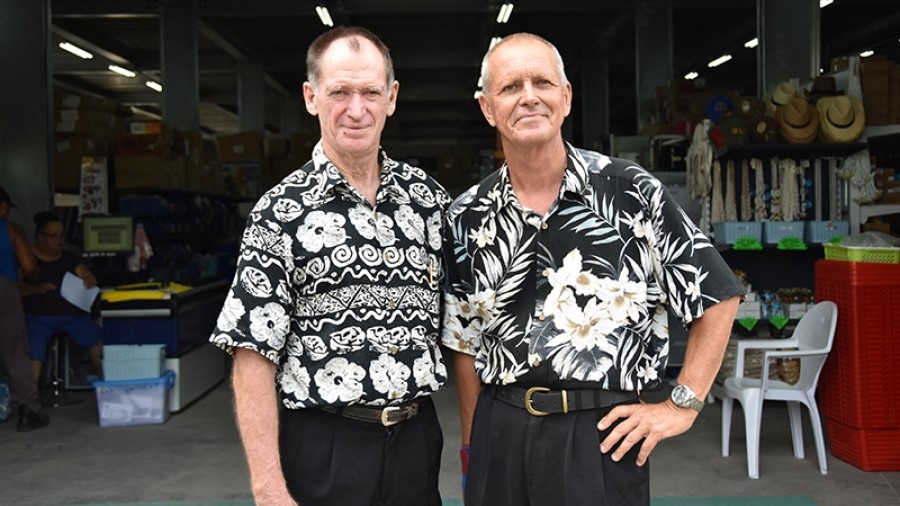Worker ‘exodus’ causes problems
Thursday 12 May 2022 | Written by Matthew Littlewood | Published in Business, National

(File photo) Raromart owner, Left, Don Carlaw with Eric Sijp. Photo: CI NEWS/ 19061422
A Rarotongan businessman is claiming that New Zealand recruitment firms are targeting immigrant workers in the Cook Islands.
Don Carlaw, who owns Raro Mart, T Shirt Factory and Raro Cars, said he had lost nine of his 65 staff, who he had sourced from the Philippines and Fiji to New Zealand in the past few months.
“We’ve lost virtually all of our panel beaters and painters for a start. It’s definitely made things difficult,” Carlaw told Cook Islands News.
‘We can’t get vehicles ready for sale, and same with out rental cars, we can’t bring them up to standard.
“But there’s a lot of other businesses who have been affected by this. It’s not just the hotels and big businesses that have been affected, it’s widespread, it goes right across the various sectors.”
Carlaw said it was not a matter of people leaving because they were badly treated, but the fact New Zealand offered better wages and living conditions.
“We’re still losing them too. It’s mainly husband and wife employees, which leave at the same time.”
Carlaw said the situation was a numbers game across all the sectors.
“It’s not that people are employing Philippine and Fijian workers ahead of locals, it’s that there simply aren’t enough locals to fill the vacancies that exist,” he said.
“It’s costing between $5000 to $7000 to employ these people, and on top of that the time it takes to interview and select them, it’s a big effort. So, to lose them is a real blow, but there’s next to nothing we can do about it.”
“We’ve got no objection to locals going to New Zealand—good luck to them, but taking contracted workers is a different situation. Once one goes, the word spreads, there’s nothing we can do.”
Carlaw pointed the finger at New Zealand recruitment firms, particularly those from Alliance Group meatworks.
“I understand that at least two different recruitment agents were on Rarotonga over this past month, and it appears that another large number have agreed to take up employment offers in New Zealand as soon as they receive their documentary clearance,” he said.
Tav Ltd owner-operator Ellena Tavioni said she had lost at least 10 Philippine workers over the past few months to New Zealand. They have about 35 staff.
“If you get offered the chance to go to New Zealand, why would you turn it down?” Tavioni said.
“They were really good workers, I upskilled them.”
Tavioni said this exodus of staff placed further pressure on her workforce.
“It’s a real headache because we’ve never been busier, and our existing staff are starting to get overworked.
“New Zealand has created this problem for us, we should get compensated.”
Renee Walker, group communications manager at Alliance Group, said: “Alliance Group predominantly employs New Zealanders, mostly in regional communities. However, we do require a small number of migrants to ease what is a chronic labour shortage across New Zealand’s red meat processing sector.
“The sector’s labour shortage has been exacerbated by the Covid-19 pandemic with members of our team required to isolate or look after family members.
“We have put initiatives in place, including a staff referral payment and an increased minimum hourly rate, to try and address these issues, but the reality is with low unemployment and borders only just re-opening, the local labour market is tight and we need migrant workers to make up the shortfall.”
Cook Islands Principal Immigration Officer Kairangi Samuela said: “this is a difficult situation and I empathise with employers who are also trying to manage their businesses with skilled workers that they bring at great cost to themselves”.
“From an immigration perspective, we cannot prevent the departure of persons from the Cook Islands unless we have an order issued by the Courts to do so,” Samuela said.
“Cook Islanders have also been acting as recruitments agents for overseas companies, especially in the seasonal work programme, as has been evident on social media. We cannot prevent this as Cook Islanders can carry out activities without restrictions.”
Samuela said immigration has not issued any permits to recruitment officers to conduct activities here in the Cook Islands, nor had they received any applications for these permits.
“We would not issue permits for this type of activity as it is not in the best interest of the Cook Islands to have persons from overseas recruiting for their businesses offshore,” she said.














































